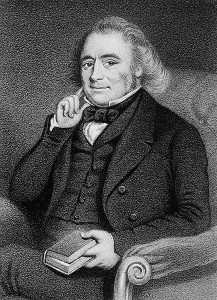Many people know and love the work of Samuel Taylor Coleridge; but what they may not know is that Coleridge had three children who also grew up to be writers. The oldest of these children was Hartley Coleridge, who wrote not only creative pieces but also literary criticism. One of his best poems is “Early Death,” about a girl who dies young:
She pass’d away like morning dew
Before the sun was high;
So brief her time, she scarcely knew
The meaning of a sigh.
As round the rose its soft perfume,
Sweet love around her floated;
Admired she grew—while mortal doom
Crept on, unfear’d, unnoted.
Love was her guardian Angel here,
But Love to Death resign’d her;
Tho’ Love was kind, why should we fear
But holy Death is kinder?
Coleridge opens with the simile of “morning dew” (1), symbolizing the brevity of the girl’s life. Like dew, the girl’s life seems to have come and gone very quickly, even “before the sun was high” (2). The poet’s use of the phrase “pass’d away” (1) is strategic; it operates on two levels, conveying both her literal death and her leaving the lives of her loved ones. Coleridge indicates just how young the girl is by stating that she “scarcely knew/The meaning of a sigh” (3-4). Before even understanding basic emotions like grief, she has gone.
The second stanza is saddest, in that it tells of how sweet and lovable the girl was, even as she grew unknowingly sick. Like a “rose” (5) with its “soft perfume” (5), the “sweet love” (6) that surrounds her is natural, inescapable. She came to be “admired” (7), even as “mortal doom” (7) threatened. It’s all the more heartbreaking that this sickness comes on “unnoted” (8); it wasn’t even perceptible.
Coleridge explains that “Love” (9) is what kept the girl safe on earth, but that even this, her “guardian Angel” (9), must give her over to “Death” (10). As painful as it is to come to terms with, each person must go when Death beckons, and thus Love had to let her go. The last two lines can be interpreted in two ways: the question could mean, “Why should people fear death when it’s even easier than love?” or, that we should fear death because it is even harsher than love. Either way, the poem is thought-provoking. Of course, it is tragic that the young girl has died, but she could be in a better place. Perhaps this is why Coleridge ends on an ambiguous note: because at times, death is bittersweet.
- Read a post on one of Coleridge’s contemporaries
- Read another post on the loss of a young child

 “Early Death” by Hartley Coleridge
“Early Death” by Hartley Coleridge




 Having an Estate Plan Is Essential – So Is Discussing It With Your Children
Having an Estate Plan Is Essential – So Is Discussing It With Your Children
 The Healing Sound of Singing Bowls
The Healing Sound of Singing Bowls















